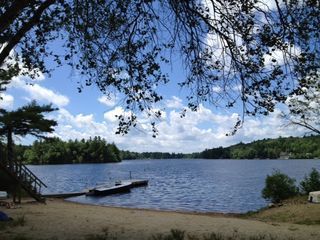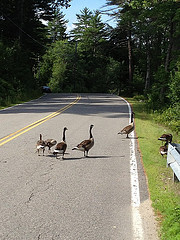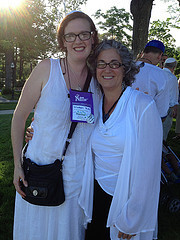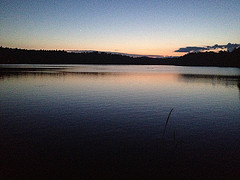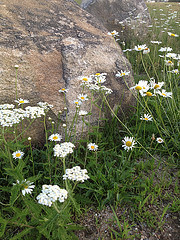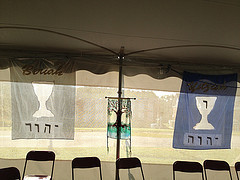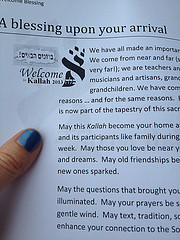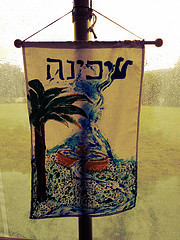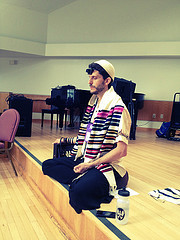Rachel Barenblat's Blog, page 184
July 14, 2013
Sealing the story in: a Watsonian reading of Dvarim
Here's the d'var Torah I offered for last week's Torah portion yesterday at my shul. (Cross-posted to my From the Rabbi blog.)
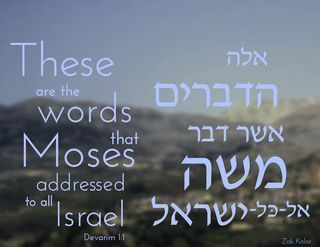 The book of Dvarim, also known as Deuteronomy, begins on the far side of the Jordan River. Most of us don't speak Greek, so the Greek name Deuteronomy doesn't mean anything to us beyond being the name of this book of the Torah. But it comes from the Greek Deuteronomion, which means "second law." This book of Torah is called Deuteronomy because it is largely a retelling. The Hebrew name Dvarim can mean either "words" or "things." The opening line of the book reads, "These are the words (or things) which Moshe said to all Israel on the other side of the Jordan." Over the course of this book, Moshe will remind the Israelites of the journey they've undergone.
The book of Dvarim, also known as Deuteronomy, begins on the far side of the Jordan River. Most of us don't speak Greek, so the Greek name Deuteronomy doesn't mean anything to us beyond being the name of this book of the Torah. But it comes from the Greek Deuteronomion, which means "second law." This book of Torah is called Deuteronomy because it is largely a retelling. The Hebrew name Dvarim can mean either "words" or "things." The opening line of the book reads, "These are the words (or things) which Moshe said to all Israel on the other side of the Jordan." Over the course of this book, Moshe will remind the Israelites of the journey they've undergone.
In this week's portion, which is also called D'varim, Moshe reminds them of a few choice incidents. Notably, the moment when he realized he couldn't do everything himself, so he appointed magistrates and judges to share the burden of leadership -- and the the time when they sent twelve scouts into the promised land, and ten of the scouts lost faith in God, which doomed the whole generation to wander in the wilderness. And then Moshe reminds them of some of the battles they've experienced. Both the hard stories, times when God warned them that She was angry and wasn't going into battle with them -- but the people failed to listen, and went into battle anyway, and lost grievously... and the proud stories, times when they defeated powerful rival kings and nations, because they had God on their side.
Leaving aside for the moment how we respond to the theology which said that God went with us when we won, and God was angry at us when we lost -- what is going on in this parsha? Place yourself in the sandals of the children of Israel. They've just spent forty years in the wilderness. They've encamped on the banks of the river which is the final boundary between them and the nation they intend to conquer. Why are they listening to the retelling of a story they just lived?
From a historico-critical point of view, one could make the case that this is a visible seam between two different stories, written down at different times. For those who are serious Sherlock Holmes fans, this is called the Doylist perspective: looking at the story with awareness of the circumstances of its authorship. But from a Watsonian point of view -- looking at the story from the perspective of someone who is inside the story -- there's a different way to make sense of this retelling. Moshe is retelling the story they've all just lived through because it's a way to sanctify their memories and seal those memories into their hearts.
It's like this. Imagine you throw a big party -- a wedding, or a b'nei mitzvah celebration, or a fiftieth anniversary shindig -- and when it's almost over, you find yourself sitting around a table with people you love, talking about what went well and what you might do differently next time. You reprise the event you've just experienced: wasn't that a fabulous dress on Aunt Shirley, how about those cigars Uncle Jay brought in his vest pocket, did you hear that story Grandma told about the time when... (And so on.) In retelling the story of what you've just experienced, you stretch out the pleasure of the experience a little bit longer. You don't have to let it end quite yet, because in telling the story, you're making it last longer.
Moshe and the children of Israel have just lived through forty years in the wilderness. And it must be clear to Moshe that this is an inflection point, a moment of transition between what has been and what's about to be. His sister Miriam is long gone. His brother Aaron is long gone. Most of that generation which experienced slavery in Mitzrayim has passed on. Moshe is at the end of an era. When he finishes retelling their story, he will be gathered up to God; that's how the book of Dvarim ends. But before he says his final farewells, he pauses to remind everyone of everything they've just experienced, the bitter and the sweet.
We read this parsha as we're beginning to approach the end of 5773. Tisha b'Av is this coming Monday night and Tuesday; from Tisha b'Av, it's seven weeks -- a mere forty-nine days -- until Rosh Hashanah. What would it be like to pause now and reflect on the year now ending -- the bitter and the sweet -- before we cross the river into the unknown future which awaits us? How might our new year change if we paused now to remember the old year from start to finish, if we paused now to make teshuvah for the places where we missed the mark?
Of course, every retelling is different. My retelling of 5773 will be different from yours. My memories of this year are my own; the places where I feel proud, the places where I feel chagrined, are my own. And by that same token, the story Moshe tells as the children of Israel are encamped by the river is the story as he remembers it -- shaped by his own memories, his places of frustration and his places of joy and pride. We don't know what story each of the other Israelites would have told about their generation of wandering: about eating manna, welcoming Shabbat week after week in the wilderness, the scouts and the battles. But even if we would tell the story of this journey, the story of this year, differently, there is common ground. All of us could benefit from pausing to tell the story of who and where we've been. All of us will experience a different transition into the promised land, into the new year, if we stop to recount how we got here and what we learned along the way.
Image source: Devarim | Flickr.
July 12, 2013
A delicious mikveh before Shabbat... with a few surprises
As Shabbat approaches, here's one final post about the ALEPH Kallah -- a mikveh story from last Friday...
Mikveh spot, Kallah 2013. Photo by Miriam Charney.
There are few things I love more in this world than a Jewish Renewal pre-Shabbat mikveh, especially when it comes after a dense and delicious week of learning and playing and praying together.
We gather at the lake and shoo away the men and boys; this is our reserved time at this beautiful beach. There are no screens to shield us here (as there usually are at Isabella Freedman), but the beach feels secluded. Anyway, our time is short -- the men will be here in 45 minutes -- so we shrug and get moving. We strip down to wherever we are comfortable: some of us in swimsuits, some clothed, most naked. (Some enter the water clothed and then become naked.) We are old, young, tall, short, curvaceous, skinny, pale, dark. Some of us bear scars, empty spaces where one or both breasts used to be. We are here to immerse before Shabbat, and to emerge ready to welcome and honor the Sabbath Queen.
I walk into the waters, soft sand beneath my feet, until I can barely stand. We are bobbing up and down gently in the dark lake. The waters are as dark as strong tea from the tannins in the pine needles which litter the lakefloor. We sing a chant as more women join us. Our mikveh leader reminds us that when we were babies, someone looked at our thighs and said "what beautiful pulkes!" A ripple of wistful recognition runs audibly around the group. Many of us remember hearing that said to our beautiful chubby babies before they began to crawl. I remember our son's sweet baby thighs and how much I wanted to just kiss kiss kiss every inch of his beautiful skin.
And then she tells us that our thighs are still beautiful, and a rueful sigh floats over the surface of the waters. How many of us are able to truly feel that? And our bellies -- how frequently we wish them away, bemoan their size, agonize over their curves. They, too, she tells us, are beautiful. Our breasts, or the places where breasts used to be: beautiful. Every inch of every one of us is beautiful. Each one of us is a reflection of God.
I wish that it weren't profoundly countercultural to tell a group of women -- ranging in age from twenties to eighties -- that each one of us is beautiful, that we are made in the image of God, that we should cherish our bodies instead of resenting or loathing their "imperfections." But it is. And it's deeply moving to hear these things sweetly said by the rabbi who is leading our ritual. Maybe in this moment, as Shabbat approaches, we can really believe her. We can wash away the decades of learned self-deprecation and emerge from the waters knowing our own beauty.
We break into groups of two and three so that each woman can be witnessed by one or two holy spirit sisters as she dunks. We begin sharing quietly with our sisters what we wish to release on our immersions, what we want to wash away (spiritually speaking) in order to greet the Shabbat Bride with a whole and joyful heart.
And then two police cars pull up, lights flashing.
Some of our fellow-travelers, on the road near the lake.
A ripple of chatter moves through our gathering: laughter, disbelief, anxiety. Most of us are naked beneath the lake's dark waters, and the sudden arrival of the police breaks the integrity of our ritual space. Someone who is clothed walks up the beach to find out what's going on. Are the police going to stop our ritual?
People in the surrounding houses, it turns out, have seen the spectacle of these dozens of women entering the lake with our varied bodies, and they called the cops. (Maybe they think we're about to enter into some kind of Sapphic bacchanal?) The police have come, embarrassed but firm, to ask us to clothe ourselves.
Some of us are scared. Some of us are amused. Some of us are upset. In any event, we're already underwater; our ritual is already underway. There's no point in getting out again until we're done. (The waters are so dark that once we're submerged, we aren't visible anyway.) We agree that we will stay submerged, and that we will impart this new instruction (enter the lake clothed, and you can do what you want once you're underwater and invisible) to the men when they come for the next shift. Once the police cars depart, we refocus ourselves and return to our mikveh buddies.
It's difficult to regain precisely the spirit-filled consciousness I felt before the police arrived. It reminds me of being a nursing mother. I used to get exasperated when I encountered people who were offended by the sight of a baby at the breast. "This is what my body is for," I always wanted to say. "If you're bothered by it, then don't look. But don't ask me to hide. What I'm doing is holy." What we're doing today is holy, too: nourishing our souls with a return to the divine womb before Shabbat, as symbolized by this lake of living waters. And we had permission to use this lake in this way. Why is it always incumbent on women to conceal ourselves, instead of incumbent on other people to avert their eyes?
After a night's sleep, I will be more easily able to empathize with the neighbors across the lake who saw us and were startled. (This is probably...not typical behavior in rural New Hampshire. And while we'd received university permission to use the lake for our mikveh, we hadn't realized that people across the lake or out on boats would be able to see us and would be alarmed.) In the moment of the mikveh, I'm caught between amusement and frustration. But I do my best to shake the frustration off. The waters are still warm, and the smiling faces of my sisters are still sweet, and Shabbat is still on the way.
I reflect on the week now ending, and immerse four times, one for each of the Four Worlds. Each time as I inhale, close my eyes, and go under, I can feel my hair floating up and then following me down. I can feel the warm swirl of lake waters around my body. When I come up, renewed and reborn, the world is bright and gleaming.
And when we are done, the chanting breaks out. We sing the chant written for mikveh at the old Elat Chayyim: "Woman I am, spirit I am, I am the Infinite within my soul, I've got no beginning and I've got no end, oh, yes I am!" We emerge from the waters whooping and dripping, sparkling with the
anticipation of Shabbat, our foretaste of the world to come. As we are hastily clothing ourselves, kohenet and rabbinic student Annie Gilbert leads us in singing "You are the body of Shekhinah, you are the body of Shekhinah," and we turn to each other and sing the words to each other and beam.
With my dear friend Deb, post-mikveh, before Shabbat.
Later that evening, in the big tent, as we sing and dance and leap and clap to welcome the Shabbat Bride into our midst, I look around the room. I am wearing silvery glitter sprinkled over my face and torso, a manifestation of the internal sparkle bestowed by our mikveh. As I look around the tent, as we welcome Shabbat, I see my holy mikveh sisters, in all of our beauty, and I can't help but smile.
Related:
Immersing with intention: creating mikveh experience beyond the mikveh, my post on the Mayyim Hayyim blog from 2011.
Six tastes of Ruach ha-Aretz, posted here in 2010 (the fifth vignette is a mikveh story.)
July 8, 2013
New month of Av and Ramadan
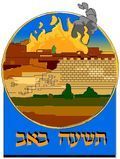 Chodesh tov: a good new (lunar) month to all. Today's new moon brings us into the month of Av on the Jewish calendar. We're moving further into our journey toward the Days of Awe. One week from tonight/tomorrow we'll observe Tisha b'Av, remembering the fall of both Temples and acknowledging the sorrow, loss, and brokenness we experience in our lives and in the world. For me, Tisha b'Av is when we really begin the journey toward the Days of Awe.
Chodesh tov: a good new (lunar) month to all. Today's new moon brings us into the month of Av on the Jewish calendar. We're moving further into our journey toward the Days of Awe. One week from tonight/tomorrow we'll observe Tisha b'Av, remembering the fall of both Temples and acknowledging the sorrow, loss, and brokenness we experience in our lives and in the world. For me, Tisha b'Av is when we really begin the journey toward the Days of Awe.
Between Tisha b'Av and Rosh Hashanah there are seven weeks. Rosh Hashanah is the 50th day after Tisha b'Av, as Shavuot is the 50th day after Pesach. Some have the practice of doing a kind of reverse Omer count during these seven weeks -- I wrote about that a little bit in my editor's introduction to Shifrah Tobacman's Omer/Teshuvah. Like the period of the Omer, the seven weeks between Tisha b'Av and Rosh Hashanah are a period of introspection and deep soul-work.
As we enter the month of Av, our Muslim cousins are entering the month of Ramadan. (That was true last year, too.) This is the last time that our fast day of Tisha b'Av will coincide with their fasting month of Ramadan for a while. In the coming Jewish year of 5774, we'll have a "leap month" -- a whole extra month, which is to say, two months of Adar instead of only one -- which means that the Jewish holidays will move forward on the Gregorian calendar by a month. The Muslim calendar is purely lunar, not lunisolar, so when we gain an extra month, they don't... which means that our fasting won't be in synch again for many years.
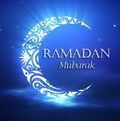 For me, there is something particularly meaningful about engaging in fasting and repentance on Tisha b'Av when it coincides with Ramadan and I know that the spiritual children of Ishmael are fasting and praying along with the spiritual children of Isaac. Our two traditions have many powerful and meaningful teachings in common. (I'm still grateful for the experience of the Emerging Jewish and Muslim Religious Leaders retreat back in 2009, which I wrote about in the essay Allah is the Light: Prayer in Ramadan and Elul.) Especially for those of us who pay attention to the Middle East, it's easy to get caught up in news stories about Jewish-Muslim conflict -- but that's not the only paradigm for our two religious communities. Maybe the experience of fasting alongside one another this Tisha b'Av and Ramadan can help us experience our similarities anew.
For me, there is something particularly meaningful about engaging in fasting and repentance on Tisha b'Av when it coincides with Ramadan and I know that the spiritual children of Ishmael are fasting and praying along with the spiritual children of Isaac. Our two traditions have many powerful and meaningful teachings in common. (I'm still grateful for the experience of the Emerging Jewish and Muslim Religious Leaders retreat back in 2009, which I wrote about in the essay Allah is the Light: Prayer in Ramadan and Elul.) Especially for those of us who pay attention to the Middle East, it's easy to get caught up in news stories about Jewish-Muslim conflict -- but that's not the only paradigm for our two religious communities. Maybe the experience of fasting alongside one another this Tisha b'Av and Ramadan can help us experience our similarities anew.
Want to know more about this new month on the Jewish calendar? The name Av means "father." One mystical tradition (found in the Sefer Yetzirah) associates this month with the letter tet / ט (which, since Hebrew letters are also numbers, corresponds to the number nine.) This letter is understood to resemble the shape of a womb. I love that the month whose name means "father" is associated with the womb -- what a beautiful encapsulation of the gender-bending (or gender-transcending) realities of God! (The masculine God-name HaRachaman / The Merciful One shares a root with rechem / womb, so there's a way in which our tradition is always engaging in this kind of gender-bending God-talk. I wrote about that a few years ago -- Returning to the divine womb.)
The Sefer Yetzirah also associates different months with different senses. The special sense of last month, Tammuz, was sight; the sense of this month is hearing.
"To hear" in Hebrew means "to understand," to fully integrate into one's consciousness (into one's heart, not only to understand intellectually in one's mind). To hear another is to fully understand his dilemma and emphasize with him...
The sense of hearing is the sense of inner balance. (Imbalance is the source of all fall and destruction). A well balanced ear, a well oriented sense of hearing, possesses the ability to discern and distinguish in everything one hears truth from falseness, as is said (Job 12:11 and 34:3): "the ear discerns words"/ ozen malin tivchan (the initial letters of this phrase spell emet--"truth").
The word Av contains the first two letters of the Hebrew alphabet: alef, beit, which are the first letters of the words emunah and bitachon, "faith" and "trust." This month we strive to return to our beginnings, to the alef from which all creation unfolds, and to find faith and trust there.
adapted from various teachings about Av at Inner.org
As we move into the month of Av and Ramadan, may we truly be able to hear one another -- not despite our differences but in and through them. May we empathize with one another. May we find inner balance. May we experience faith and trust. And whether or not we fast from eating on Tisha b'Av or during Ramadan, may we fast from unkindness, from ingratitude, from our worst inclinations. May we take advantage of this month and cultivate our hearts and spirits to serve God and to serve the world.
Chodesh tov / Ramadan mubarak!
Here's a blessing for the new month -- in Hebrew, transliteration, and English -- written by Marcia Falk: Prayer for the New Month.
July 5, 2013
Five more glimpses of Kallah
Lake; Fourth of July.
1.
The Fourth of July. I choose the morning service which is described as "You've heard of downward dog? This is Upward God! Bring your inner Mahalia Jackson." It's led by two dear friends of mine, Rabbi Jan Salzman and Rabbi Mark Novak. Both have wonderful voices and shining neshamot / souls.
Reb Jan begins by humming America the Beautiful, and we pick up the humming along with her. Once we've hummed it through once or twice, Reb Mark speaks over the top, beginning "I have a dream..." He quotes Isaiah: the rough places will be made plain, the crooked, straight. He describes the prophet's dream of messianic reality, and speaks aloud his prayer that this should be the nation we build together.
And then we begin our morning service by singing "Adon Olam" to that same tune. And my heart opens right up: to God, to my hopes for this country, to this community, to the people sitting in this circle and singing with all their hearts, to purple mountain majesties above the fruited plain.
2.
One of my students comes up to me and tells me that he's been talking with his eleven-year-old son about writing psalms, and that his son totally "gets" it, and that his son wants to write psalms now too. He tells me that he and his wife have brought their sons to Kallah (or to Ruach ha-Aretz, ALEPH's summer program during even-numbered years) since they were six, and that his kids love it here.
It is such a delight to hear that my student is loving my class -- to hear that he's talking about it with his kids -- to hear that his kids are into it, too -- to hear that his young son understands immediately that he, too, can be a modern-day psalmist and can speak the words of his heart to God. To think of a little boy growing up with annual dips into this precious co-created Brigadoon where we learn and sing, play and pray, in conscious community.
That afternoon we work on psalms of "negative" emotions -- sorrow, grief, loss -- and my students really go there with me. It's a deep class and a powerful one. I am humbled by their participation and their trust. Grateful to be here with them.
Wildflowers.
3.
I walk down to my apartment, change into my swimsuit, tie my room key around my neck, and walk across the street and down the road to the lake. The sky is blue, the trees are green, the water is steeped the color of dark tea from the tannins of countless pine needles.
I slip off my sandals and walk slowly into the water, feeling my way on the unfamiliar sandy bottom. The water is cool, the sun is bright, the voices of people talking and laughing surround me. People are gliding across the lake lazily on bright red kayaks which draw the eye. I take a deep breath, close my eyes, and submerge for a moment. When I come up, the voices and the laughter are even sweeter than they were before. A kind of precognitive echo, a ripple, of the mikveh immersion to come on Friday afternoon.
4.
On my way back to my apartment, I find a duck feather, gleaming at me in the grass. I bring the duck feather to Rabbi Kevin Hale, "the barefoot sofer," who is teaching a class on sofrut and Torah repair this week. My intention is to ask whether he needs more quills for his students. But he has a great big pile of goose and turkey feathers, and my little duck feather is not needed. To my surprise, he says instead, "would you like me to cut it for you?" And then he offers me a tiny vial of ink and a scrap of klaf -- a bit of marginal parchment from a 100-year-old Torah.
I am unaccountably moved. To my sorrow, the piece of parchment disappears sometime during my psalms class -- there was too much commotion in the room, and it must have floated away on the wind -- but I carefully carry the ink and quill to a safe place. I don't know that I will ever learn sofrut, but in even trying to use the tools of that trade, I feel closer to every beautiful handwritten letter of every Torah, everywhere.
Banners in the tent, before anyone arrived to daven and drum.
5.
Friday morning I decide to try the drumming davenen. We're in the tent, translucent yud / heh / vav / heh banners glimmering in the sunshine. Together, Rabbi Ilan Glazer and Akiva the Believer lead us in a morning service with drums. This isn't a drum circle; it's a service, and our davenen follows the traditional mat'beah tefilah, the order of prayer. We will touch on each of the liturgical touchpoints of the different prayers, accompanied by drumming.
When I arrive, my intention is to daven but not to drum. But as the davenen gets going, and I see that there are a few unclaimed drums in the circle, on impulse I get up and grab one. When and where else am I going to try this?
It feels great. I love being part of the music we're all co-creating as we pray. And I'm not as inept as I thought I would be; maybe I've absorbed a few rhythm patterns from twenty years of life with Ethan! As we drum and pray and sing, people get up and dance through the psalms. For our silent amidah we enter into a simple eighth-note beat. First one drummer alone, then two, and then one by one we all take it up. We sustain it for ten minutes. I close my eyes. Are we playing the beat, or is the beat playing us?
After the service, my left arm is striped from my tefillin and my right hand reverberates from the drumming. Marks on my body, sealing and recalling the experience of heart, mind, and soul.
A psalm of amazement (upon studying quantum physics)
PSALM OF WONDER
upon studying kabbalah and quantum physics
I boast I grew a baby
from component cells. Big deal:
You built the cosmos
from component atoms, and those
have moving parts which shift,
performing particle or wave.
As photons yearn for the void
my heart yearns for You
though when we meet
I disappear.
When I ascend the ladder
I understand entanglement
though when I fall back down
my human brain can't grasp
the endless ein-sof
of Your quantum fields.
for R' Fern Feldman and Dr. Karen Barad
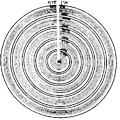 On the second day of the class I'm teaching (on writing the psalms
On the second day of the class I'm teaching (on writing the psalms
of one's heart), we worked with psalms of wonder and amazement. After
reading a variety of psalms (classical and contemporary) and talking
about them, we entered into a generative writing exercise and then wrote
our own psalms of awe.
Since I'm taking an extraordinary morning class on kabbalah and quantum physics,
that was what came immediately to my mind when I thought about wonder.
Anyway: for those who are interested, here's the end result of that 20
minutes of psalm-writing, once again lightly revised from its original
form.
Ein-sof means "without end," and is a kabbalistic term for God's most transcendent aspect.
July 4, 2013
Prayer for our country (on the 4th of July)
In many communities, including mine, there is a tradition of reading a pair of prayers toward the end of services: one prayer for our own nation, and one prayer for Israel. At my small shul we don't do this every week, though we do maintain the tradition of reading these two special prayers during the Days of Awe. As our Prayer for Israel, in recent years we've used a text written by Nahum Waldman (available here at the URJ website). As our prayer for our own nation, this year we'll be using something new. I enclose it below in case it's helpful to anyone else -- either as something to tuck away for your own upcoming High Holiday services, or for your 4th of July davenen, or however else you see fit. Feel free to use it and share it, as long as you preserve its attribution.
Prayer For Our Country
O God and God of our ancestors
receive our prayer for this land which we love.
Pour out Your blessing on this nation
and on everyone in our government.
Give those who serve our country
innate appreciation for the Torah's principles
of justice and peace.
Help them to see Your face in every constituent.
Cultivate in them, and in us,
the sense that we are all one family
obligated to care for each other
with kindness and compassion.
Banish hatred from our hearts
and from the hearts of our elected officials.
Help us to make this country
a light unto the nations.
May it be Your will
our God and God of our generations
that this nation be a blessing
to all who dwell on earth.
Help us to enact the words of Your prophet:
“Nation shall not lift up sword against nation.
Neither shall they learn war anymore."
And let us say: Amen.
Rabbi Rachel Barenblat
July 3, 2013
A psalm of praise for an ice cream cone
 In my Kallah class on Writing the Psalms of Your Heart, we spent our first day on psalms of praise. We brainstormed a bit about what psalms are and how they work, read some psalms of praise (both classical and contemporary), and spent some time in class writing our own psalms and then sharing them aloud.
In my Kallah class on Writing the Psalms of Your Heart, we spent our first day on psalms of praise. We brainstormed a bit about what psalms are and how they work, read some psalms of praise (both classical and contemporary), and spent some time in class writing our own psalms and then sharing them aloud.
I decided it wasn't fair of me to ask my students to do something I wasn't also willing to do, so I worked on a psalm along with them. Just for kicks, here's the psalm I wrote, lightly revised since its original creation. Enjoy!
FOR ICE CREAM
a psalm of praise
Praise for these soft cold curls
of maple walnut ice cream.
Praise for the scent of earliest spring
distilled into pungent sweetness.
Praise for the cold, so shocking in July,
as ice cream meets my tongue.
Praise for the cows who ate the grass
and made the milk, praise for the farmer
who sat on a low stool
in a barn that smelled of manure and hay
to squeeze the udders, or the milking machine
which impersonally coaxed the milk forth.
Praise for the giant mixer
which churned the wet slush of ingredients
with all the grace of a February snowplow.
For the trees which grew the walnuts,
for the maples whose lifeblood was donated
to this worthy cause: praise
to the One Whose abundance flowed
into creation, Who takes pleasure
in my pleasure, now and always.
Gleanings on kabbalah and quantum physics
 My morning class at Kallah this year can be summed up (so far) as: I feel like I'm trying to pack the time vortex of a TARDIS into my head! The morning class I'm taking at Kallah this year is "Infinity, Nothingness, and Being: Running and Returning, An Exploration in Quantum Physics and Kabbalah, and I'm loving it. I want to share some glimpses of the class with y'all, but I find that I'm struggling to articulate the learning succinctly. This kind of learning is almost like a mystical experience -- I grasp it in a flash of joyous insight, and then when I try to describe it, it slips through my fingers! But I'll try anyway.
My morning class at Kallah this year can be summed up (so far) as: I feel like I'm trying to pack the time vortex of a TARDIS into my head! The morning class I'm taking at Kallah this year is "Infinity, Nothingness, and Being: Running and Returning, An Exploration in Quantum Physics and Kabbalah, and I'm loving it. I want to share some glimpses of the class with y'all, but I find that I'm struggling to articulate the learning succinctly. This kind of learning is almost like a mystical experience -- I grasp it in a flash of joyous insight, and then when I try to describe it, it slips through my fingers! But I'll try anyway.
"I believe that each thing we say, every thought we think, the kavanah we bring to prayer, every way in which we meet the universe, it all matters -- not only in the sense of making meaning, but in the sense of making things matter, e.g. making things materialize, bringing the universe into being anew in each moment."
That's Dr. Karen Barad, one of the teachers of this morning class (she's teaching with her wife Rabbi Fern Feldman.) Rabbi Fern is focusing on the Jewish texts and mystical material; Dr. Karen is focusing on the physics. Rather than drawing analogies between kabbalah and physics, they aim to offer a nondual approach. They're not arguing that quantum physics is just now discovering what kabbalists have known for centuries, or that kabbalah can or should be updated on the basis of contemporary physics. "Instead, we're going to diffractively read kabbalah and quantum physics through each other."
The idea of diffraction recurred repeatedly over the course of our first morning. Diffraction, I learned, refers to the patterns that waves make. (I'm one of the people in the class who has comfort and familiarity with the Jewish mystical texts, but only a dim memory of high school learning about the physics side of things.) First we got an overview of the classical / Newtonian understanding of particles and waves, and then the quantum stuff proceeded to complicate and problematize everything we thought we'd grasped!
 One of my favorite parts of the first class was when we read some Ezekiel (the start of chapter 1, the vision of the fire with lightning sparking in it, and creatures who had the appearance of fire sparking with lightning, וְהַחַיּוֹת, רָצוֹא וָשׁוֹב / v'ha-chayot ratzo v'shov, and those creatures "ran and returned"), and then paused to learn about how lightning works. (Did you know that lightning involves an upward flow of ions / energy as well as a downward flow? That dovetails with some extraordinary metaphors for divinity -- I'm having Yom Kippur sermon ideas!)
One of my favorite parts of the first class was when we read some Ezekiel (the start of chapter 1, the vision of the fire with lightning sparking in it, and creatures who had the appearance of fire sparking with lightning, וְהַחַיּוֹת, רָצוֹא וָשׁוֹב / v'ha-chayot ratzo v'shov, and those creatures "ran and returned"), and then paused to learn about how lightning works. (Did you know that lightning involves an upward flow of ions / energy as well as a downward flow? That dovetails with some extraordinary metaphors for divinity -- I'm having Yom Kippur sermon ideas!)
Then we spent some time on Rutherford and Bohr and their atomic models, and on the definition of a quantum leap -- when an electron moves from one energy state to another within an atom. (In other words: contrary to the way the phrase appears in popular culture, a quantum leap is unthinkably tiny.) And then we spent more time with Torah, Midrash, Zohar. All morning long we oscillated between the two paradigms, mysticism and physics, bringing a deliciously poetic sensibility to both.
Rabbi Fern led us through the Biblical account of creation, showing how creation is an eternal fluctuation, a continuing process. "When God was beginning to create the heavens and the earth, the earth was tohu va-vohu" -- wild and waste, empty and void, chaos and a kind of echoing response which floats back over the chaos. Light is in the liminal space between being and not-being, until God says "yehi or," let there be light. (And speaking of that word יהי / yehi - it's spelled yud/heh/yud. The yud is the primal point from which all else flows; the heh represents expansion; the yud is another point. The very Hebrew letters of the word which means "let there be" set out a pattern of emerging from, and returning to, the nothingness.)
"In quantum physics," said Dr. Karen Barad, "we call this a vacuum fluctuation. The vacuum isn't empty; it has structure which foreshadows the possibility of other things. An echo of what might yet be." And there is vacuum, and void, in the tiniest spaces -- the spaces between energy levels in a single atom. As an electron changes energy levels, it makes a quantum leap from one energy level to another -- but in between the two energy levels, there is nothing (no-thing, nothingness), so where is the electron in the moment of shifting between one state and the next? Maybe it re-enters the vacuum and void, the tohu va-vohu from before Creation.
 We looked at a text from Rabbi Itamar Schwarz about cycles of being and nothingness. He teaches that day is yesh (being / thing-ness), while night is ayin (nothingness). Every night we dip into the nothingness, into the void, when we sleep. We talked about the idea that in every moment we are filled with and held by the no-thing-ness. In our ordinary consciousness we can just barely touch the awareness that there is a constant flickering of אני/ ani and אין / ayin, awareness of self and nothingness. (The two words are spelled with the same letters in different permutations, which allows for some lovely kabbalistic wordplay.) It's not a succession; rather, we are always both.
We looked at a text from Rabbi Itamar Schwarz about cycles of being and nothingness. He teaches that day is yesh (being / thing-ness), while night is ayin (nothingness). Every night we dip into the nothingness, into the void, when we sleep. We talked about the idea that in every moment we are filled with and held by the no-thing-ness. In our ordinary consciousness we can just barely touch the awareness that there is a constant flickering of אני/ ani and אין / ayin, awareness of self and nothingness. (The two words are spelled with the same letters in different permutations, which allows for some lovely kabbalistic wordplay.) It's not a succession; rather, we are always both.
That's some of what I got out of the first day of class. The second day is even weirder and more awesome: from chochmah (unitive) consciousness and binah (binary) consciousness (Sefer Yetzirah, my old bailiwick!) to how the nature of nature itself changes depending on how we examine it. Maybe my favorite part of the morning was hearing Dr. Barad teach about ontological indeterminacy, which is to say, the teaching that there are no "pre-existing, determinately propertied and boundaried objects to be disturbed by measurement interactions." (Or in other words, ultimately, there is no such thing as an independent thing to be measured. That's Neils Bohr, if my notes can be trusted.)
In Dr. Barad's paradigm, which builds and expands on Bohr's, subject and object intra-act. Through intra-action, they become boundaried and propertied, but they're ultimately inseparable in their mutually determining ongoing intra-acting. Quantum entanglement means not that "this" and "that" are entangled, but
that there is no "this" independent of "that." Both are part of an
inseparable whole. It's one thing to make this assertion as a theological statement -- ein od milvado; nothing has independent existence (apart from God) -- and another thing entirely to assert this as a matter of physics.
We did some neat learning about the double-slit experiment, which shows that electrons can behave both as particles and as waves. Get this: electrons are not inherently waves or particles. Depending on which apparatus an electron is interacting with, it performs either particle or wave. This is, I'm sure, not new to any of y'all who've studied this field before! But it was entirely new to me, and it blew my mind...especially reading it right after studying some Sefer Yetzirah about different states of consciousness and how we perceive things in those different states. Maybe the bizarre koan that electrons perform particle or wave based on how we're measuring them can only be understood in chochmah consciousness (wisdom-consciousness, unitary consciousness) when we're at one with the Divine.
I'll close with a tiny bit of what I heard Rabbi Fern say on the second day, after leading us through part of a text called Yam HaChochmah / the Sea of Wisdom:
If we imagine everything unified and connected, there can be no giving and receiving. If we're completely separate, there's no flow between. It's only when we make an agential cut, recognize that there's a phenomenon through the intra-action of which there is an emanator and emanated, a giver of flow and receiving of flow, that the giving and receiving can take place. That's how we experience our connections: with Hashem, with each other, with all existence.
Holy wow! Anyway... this class is stretching my brain in exciting new directions, and I'm having a blast.
(For more on this, don't miss Dr. Karen Barad's book Meeting the Universe Halfway - which now resides on my Kindle and I'm psyched to read it.)
July 2, 2013
Five glimpses of the start of Kallah
1.
A faculty meeting. The evening before everything formally begins.
It takes about ten minutes to get everyone in the room, to arrange the chairs the way we want them, that kind of thing. In a lot of contexts, we would have spent those ten minutes kibbitzing, or possibly kvetching about our travel experiences or whatever's not going right in our day.
Not here. Rabbi Shefa Gold opens up her sruti box and begins singing a two-part Sim Shalom round. (One of her own chants, naturally.) The music builds as we all pick up the melodies. Soon we're singing it as a round. The melody ripples and swells in the bright and airy room.
By the time the meeting begins -- a good ten minutes later, but no one minds, because the singing feels like prayer -- the energy in the room has shifted and I feel I'm part of something bigger than myself.
2.
Looking at the schedule for Tuesday morning davenen. There are several options: Yoga Shalom (the service interwoven with yoga), Davennen in the Vernacular (davening in traditional nusach -- but in English), Davennen in Nature through the Torah of Metaphor. It's hard to choose.
But what really cracks me up is the juxtaposition of Speed Davvenen ("No time to think; just say the words one after the other, as fast as you can. A popular form of meditation for centuries, Minhag Eretz Yisrael, as practiced in Tzfat...") and ShEmanic Journey ("Are there too many words in your davvenen these days? Let's try working with six. We will explore the many ways the Shma can transport us to davvenen bliss through chant, gently guided meditation, and light authentic movement.")
That's Jewish Renewal in a nutshell right there. Speed-daven all of the words in the siddur as fast as you can, considering it a form of ancient meditation -- or strip the whole service down to the six words of the first line of the Shema. Neither approach has to cancel out the other. Both are ways of approaching the Divine.
3.
I have every intention of going to mincha (afternoon services), but it's a ten minute walk away in the rain, and I stop to say hi to someone I haven't seen in a long time, and then someone else, and next thing I know, I'm too late.
Instead I wind up hanging out with two friends by the bank of enormous windows at the back of the building where the shuk is. One of us starts singing the ashrei, the first prayer of mincha, and next thing I know, we are quietly singing and harmonizing and making our way through the whole short liturgy of the afternoon service.
Around us, people are still wandering, browsing beautiful tallitot and kippot and books and jewelry, chatting, hugging, catching up. And we're davening by the windows overlooking the rain and the lake. I'm reminded of seeing Orthodox men in black davening at airport gates, at the banks of windows overlooking the runway, before a night flight. We would look strange to them, I suspect: we are two men and one woman, me in a tank top, all of us barefoot ("take off your shoes," God told Moshe, "for the place where you're standing is holy ground"), laughing along with our davenen. The interplay of our voices and our spirits is tight and sweet.
Even while it's happening, I know it's something I don't want to forget.
4.
Rabbi David Ingber has chosen to frame the opening plenary as a Hasidic-style tisch, a table gathering in which the rebbe's teaching is framed with niggunim and melodies. After a beautiful ma'ariv service led sweetly by Rabbi Jack Gabriel and a bevy of musicians, we fill the stage in the big tent with musicians of our own and we sing a Chabad niggun.
There is drumming (Akiva the Believer and Shoshanna Jedwab -- my cup runneth over!), there is guitar, there is piano, there is clarinet -- and there is a tent full of several hundred happy people singing. Soon there is spontaneous dancing. It is amazing. It feels like a tent revival. A happy, hippie, neo-Hasidic, egalitarian, feminist, queer-friendly tent revival.
Reb David introduces the notion of the plenary as tisch, and quips that it is a plen-isch -- and since we're Renewal Jews, it's a re-plen-isch. (Get it?) But against all odds, the evening really does feel replenishing. I share poetry and musings. Rabbi Riqi Kosovske shares a classical nursing prayer. Rabbi Ebn Leader sings "Memaleh kol almin, u-sovev kol almin" -- "You fill all worlds and surround all worlds, and without You there is no existence at all" -- so soulfully that I get shivers.
In between our teachings, we sing niggunim to seal the learning into our hearts. And we sing a Shaker hymn, which goes like this:
When you love-not one another in daily communion,
how can you love God whom you have never seen? (2x)
More love (2x)
The heavens are calling
the angels are singing
O Zion, more love, more love.
To close, Rabbi David Ingber tells an extraordinary story about why there is a tiny א in the first word of the book of Vayikra/Leviticus: that after Moshe built the mishkan, the tabernacle, he stood outside it and wondered, is there a place here for me? I did all this work, I made this thing, but do I belong here? And God whispered so that only he could hear: come on in, Moshe. There's room for you.
What a metaphor for us here in the big tent of Jewish Renewal. Come on in. There's room here for you.
5.
In the small chapel space, my dear friend David leads the six-word Shema-focused davenen. We create a sonic tapestry without any plan or intention, and it fills the space, and it is beautiful.
We move through hearing: hearing with our ears, our bodies, our skin as interface with the world. We move through what it means to be Yisrael, standing, energizing our feet, entering into movement. (That's the most challenging part for me, but I try.) We embody the Yud-Heh-Vav-Heh with our bodies, conscious of immanence. We experience relationship with God. We connect with the Yud-Heh-Vav-Heh of transcendence, God beyond us, stretching our awareness beyond our bodies. And we break the final echad, One, into its component letters: forming the aleph with our bodies, rumbling a room full of chets, tasting the Spanish sound of the un-pointed daled.
We chant two different full shemas -- the "Reform summer camp" melody I use at shul (which feels and sounds entirely different to me in this space, accompanied by sruti box) and the triumphal Sulzer chant a cappella. The Sulzer shema comes near the end of the service, and it rings out like a heavenly shofar, energized by our deep explorations.
It's not quite like any other davenen I've ever done. What a gift.
Kol Echad: the voice of the One in the voices of the many
The theme of this year's ALEPH Kallah is Kol Echad. Last night, at the opening plenary session, four New England-based Jewish Renewal voices spoke on this theme and what it means to each of us. I was honored to be one of the speakers, along with Rabbi Ebn Leader, Joel Segel, Rabbi Riqi Kosovske, and Rabbi David Ingber. R' David was the "host" for the evening, and he patterned it on a Hasidic tisch, a dinnertable celebration featuring teaching interspersed with song. In between our teachings, we led the community in some of my favorite songs and niggunim. It was really sweet! Anyway: my remarks follow below.
Reflections on Kol Echad
Kol echad .
If you spell it כל אחד, it means "all is one." If you spell it קול אחד, it means "with one voice."
When I think of all of us speaking with one voice, I think of the teaching which says that when God gave over Torah at Sinai, God spoke with one voice and each person heard according to their abilities and inclinations. The revelation was singular; its reception takes as many forms as there are human souls, as many as grains of sand on the beach or stars in the sky.
In recent years I've been turning my attention to one very particular voice: the voice of my child. His voice awakens me, touches me, inflames me with love, and occasionally evokes my exasperation like no other. Becoming a mother has radically changed my sense of God, and of what it means to say -- as our liturgy so frequently does -- that God is our parent.
I look at our child, I listen to our child, and I see the two of us, his parents, reflected in countless ways. But I also see difference. He is his own being, wholly. (And holy.) He is full of surprises. He has his own desires and yearnings, his own inclinations, his own likes and dislikes. Is this how God feels when She listens to each of us?
We cry out with our many voices, and each of our voices reaches God.
A poem from Waiting to Unfold:�
EL SHADDAI (NURSING POEM)
Was God overwhelmed
when Her milk first came in
roused by our thin cries
for compassion?
She'd birthed creation
from amoebas to galaxies
but did She expect to see
Her own changeability
mirrored behind our eyes?
Nothing could have prepared Her
for the shift from singularity
to multiplicity.
And the blank-faced angels
offered their constant praise
without understanding Her joy
or the depth of Her fear.
There is a Talmudic saying that "more than the calf wants to suckle, the cow yearns to give milk." I learned this in rabbinic school as a metaphor for how God relates to the world. God, my teachers taught, is bursting with blessing. Our prayers prime the pump and cause that blessing to flow. Once I became a nursing mother, I had a whole new understanding of what it might feel like to be God, prickling with the urgent need called forth by our hungry wailing.
I remember my spiritual director telling my that my son would be the greatest teacher of Torah I could possibly have. And he's right. I have learned much about God and about Torah through this most mundane of adventures.
And one thing I have learned is what it means to me to pray Shma koleinu, to say that God is the One Who hears our voices.
As above, so below. God hears our voices; but we are also called to hear the voice of God. Becoming a mother taught me to think about how God hears our voices when we cry out like children...and also how we hear God's voices when others cry out to us.
If the voice of one's child is the voice of God, then sometimes the voice of God is hard to bear:
BESIEGED
Seven weeks in
I am rubble, strafed
by a round-cheeked pilot
who attacks at random
with his air-siren wail
I lie in bed
pleading with no one
for just one hour
but the monitor crackles
and deals its death blow
yet once he's milk-faced
and sleepy, head lolling
in the crook of my arm
I fall in love with the enemy
all over again
his imperious voice
and grabby hands, his eyes
like slate marbles
and his endless hunger
never satisfied
Reading that poem now, I remember the way I wanted to rebel, body and soul, against the constant need. The crying. Late-night feeding, after feeding, after feeding. And as this is true on the microcosmic scale, so it is true on the macrocosmic scale. God's voice calls us to wake up to hunger, to wake up to discomfort, to wake up to needs in the world which we know we're obligated to fill.
The voice of God calls us to bring comfort to the broken places in the world. As we move through these Three Weeks, there's an opportunity maintain the mindfulness practice of waking to the places in the world which need healing and comfort. This week, we can attune ourselves to hearing each others' cries -- as a new parent wakes from sleep when the baby wails:
COMFORTER
you wake in your crib's embrace
from the dream of a distant heartbeat
a voice says cry out!
and you cry out
bewailing the tragedy of separation
until I gather you to my breast
glowing numbers shift silently
and your desperation eases
someday you'll learn to fumble soft stars
into their places
to nuzzle your giraffe
and count adinkra like talismans
but for now I am consolation
I make the rough places plain
Of course, being awake to the many forms of the kol echad isn't only a practice of noticing what hurts. It's also a practice of noticing what's beautiful, compasssionate, and sweet. Often the kol echad is a voice of laughter and joy. One final poem from Waiting to Unfold, written at a Ruach ha-Aretz retreat at Pearlstone:
MOTHER PSALM 6
A psalm of revelation
Don't chew on your mama's tefillin
I say, dislodging the leather
from your damp and eager grasp.
We play peekaboo beneath my tallit,
hiding your face and revealing it
the way God is sometimes present
sometimes not. You like the drums,
the fiddle and clarinet.
You bang your rattle on the floor.
As we sing "Praise God,
all you elders and young children"
you bellow and and we laugh.
During silent prayer your yearning
opens my floodgates.
When the Torah is carried around
I waltz you in my arms, my own scroll.
All my prayers are written
in your open face.
The voice of God in is the bellow which interrupts formal prayer, and the laughter which follows. And the voice of God is in the mother who chides "don't chew on those straps, they're a holy object!" Though perhaps there is no more holy purpose than soothing the needs of a child.
Not all of us are parents. Some of us yearn to be parents but suffer the pain of infertility. Some of us may be estranged from our children, or apart from them when we wish we were together. But all of us have been children; all of us have given our parents the holy opportunity to hear God's voice in our voices; and each of us emerged not only from a mother's womb but also from the cosmic womb of creation. Each of us is a child of God, and when our voices cry out, God always hears us.
In the kaddish, in all its forms, there's a familiar refrain: yehei shmei rabba mevorach l'olam ul-almei almaya, "Let the Great Name be blessed in this world and in all the worlds."
Rabbi Arthur Waskow has taught that the Great Name, the Shmei Rabbah, is the Cosmic Name of God which is made up of all of our names together. When we lift up the names of all of our beloveds, the names of all of our teachers and our students, the names of those we hold dear, those names become part of something greater, as each individual star gives its brightness to the vast swirl of the galaxy.
Maybe the Kol Echad, the One Voice, works in the same way.
The more I reflect on this, the more it seems to me that God's voice is the unthinkable aggregate of all of our voices at once. If we are made in the damut and tzelem, the image and the likeness, then the only way I can begin to imagine the Holy Blessed One is to imagine every human being who has ever lived and will ever live. Surely one of the ways in which we are like our Creator is that each of us has a voice, and our voices have the capacity to create worlds and to destroy them. Kol echad: the voice of the One is made up of the infinite voices of the many.
This week may we hear God's voice when we hear one another.
May we be attuned to ourselves, and each other, as holy children of the One.
May we know ourselves, and each other, as voices of the One.
And may our voices come together to create something beautiful, precious, and strong.
Rachel Barenblat's Blog
- Rachel Barenblat's profile
- 6 followers


